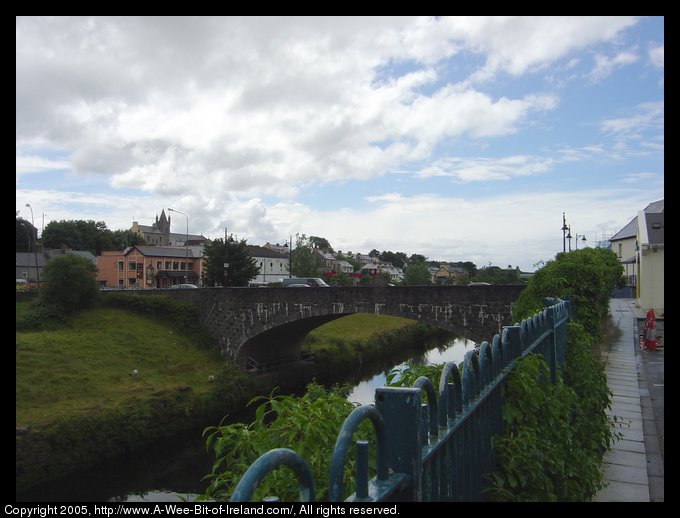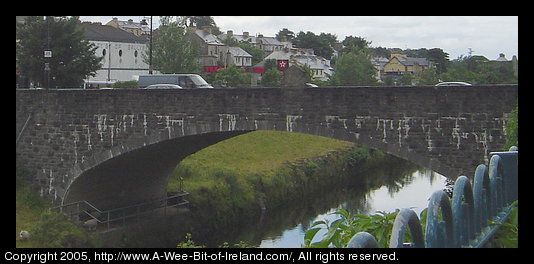Ballyshannon, Donegal
Ballyshannon (Béal Atha Seanaidh), Donegal. The bridge over the river Erne (Abhainn na hÉirne) was built in the 18th century. The river channel is deeper now than it was then because of water released from a dam upstream. A famous battle was fought here in 1597. The O'Donnells and their allies defeated the English by catching them in the ford and driving them over a waterfall.
The Donegal County Library has more infomation about Ballyshannon. (It was at http://www.donegallibrary.ie/memory/towns/ballyshannon.htm).


The translation from Gaelic to English of the Annals of the Four Masters at University College, Cork has accounts of the battles.
compiled by Karen O'Brien
Funded by University College, Cork and Seoirse Ó Luasa, An Caifé
Liteartha, An Daingean, who donated a copy of the Annals of the Four
Masters to the CELT Project.
M1597.14
On the following morning, by break of day, the Governor's army rose up to cross the river; but O'Donnell had posted guards upon all the fords of the Erne. However, they got an advantage at one difficult ford, namely, Ath-Cul-Uain, and to this they vigorously and resolutely advanced. The guards of the ford proceeded to shoot at them without mercy, and to defend the ford against them as well as they were able; but they were not able to defend it long against the numerous force and army opposed to them; so that the Governor and his army crossed it, and gained the other side. On this day, however, a lamentable death took place, namely, that of Murrough, the son of Murrough, son of Dermot, son of Murrough O'Brien, Baron of Inchiquin, as he was on horseback, in the depth of the river, outside the soldiers, saving them from drowning, and encouraging them to get across past him. But destiny permitted that he was aimed at by one of O'Donnell's people with a ball exactly in the arm-pit, in an opening of his plate armour, so that it passed through him, and out at the opposite arm-pit. No assistance could be given him; and he fell from his horse into the depth of the current, in which he was immediately drowned. The person who there perished was much lamented by the English and Irish, on account of the greatness of his wealth, and the nobility of his blood, though young as to age; and although it would have been meet that his body should have been taken up, and honourably interred, the army did not stop to do so, but proceeded directly to the monastery of Assaroe, which they reached the 31st of July, the day of the week being Saturday. They encamped around the monastery, and also within it, and thus remained from the forenoon of Saturday, when they crossed the Erne, until Monday morning. On the Sunday on which they were in the monastery the ships arrived which were promised to be sent after them from Galway, with ordnance and great guns, and other stores for their support, whilst they should remain in this strange territory. This fleet put in at Inis-Saimer, close to Assaroe, and landed their stores on the island, leaving a sufficient number to guard them. On Monday the ordnance were landed and planted against the castle of Ballyshannon. The troops were then removed from the monastery to Mullach-Sithe-Aedha, opposite the fortress, and about the ordnance. On Monday, Tuesday, and Wednesday, they continued to fire on the castle, with heavy balls, emitted with loud report and flashing flames from the loud-sounding, red, shot-vomiting guns of that heavy and immense ordnance which they had planted opposite the fortress, so that their reports and loud thundering in the regions of the air were heard far and distant from them. They sent large parties of their choicest soldiers to the base of the castle with wall-razing engines, and with thick and strong iron armour about their bodies, and bright-shining helmets on their heads, and with a bright testudo of round, broad, hard iron shields around them, to protect them from the shots of their enemies. The resolute attack they made upon the fortress, however, was of no avail to them; and it had been better for them that they had not come upon this journey against it; for from the castle were poured down upon them showers of brilliant fire from well-planted, straight aimed guns, and from costly muskets, and some rough-headed rocks and massive solid stones, and beams and blocks of timber, which were kept on the battlements of the fortress, in readiness to be hurled down when occasion required; so that the coverings of the razing party were of no shelter or protection to them, and great numbers of them were destroyed, and others who were severely wounded became so exhausted that they delayed not to be further slaughtered, and, turning their backs to their enemies, they were routed to the camp. The people of the fortress kept up a constant fire on them, and killed an unascertained number of them.
M1597.14
A party of O'Donnell's cavalry made a routing attack upon the English cavalry; and there is no record or remembrance of the numbers that were mortally wounded between them; but, among the rest, O'Conor Sligo (Donough, the son of Cathal Oge) was severely wounded, for he and O'Conor Roe (Hugh, son of Turlough Roe) and Theobald-na-Long, with all their forces, were along with the Lord Justice at this time.
O'Donnell, however, had been in want of forces, and had only a small number on the Saturday on which the Lord Justice came into the country with this powerful force; but his people and forces were assembling and flocking to him from every direction, so that the most of them had reached him before the noon of Monday. On this occasion Maguire ( Hugh, the son of Cuconnaught, son of Cuconnaught) and O'Rourke (Brian Oge, the son of Brian, son of Brian Ballagh) came to join him, with their forces; and after these chiefs had assembled together, they allowed the Lord Justice and his army neither ease nor rest, for they carried on skirmishing and firing, conflict, assault, and onslaught, on the camp, every day during the three days that they continued battering the castle. O'Donnell's army frequently drove those who were on the outskirts of the Connaught camp into the very centre of it, and those who were in the centre to the outskirts; and they did not permit their horses or other cattle to go forth outside the boundary camp to graze, nor did they permit hay or corn to be carried in to them. The Governor and his army were thus reduced to great distress and extremities; for, though they should wish to depart, they could not approach any common ford on the Erne from Cael-Uisge to Ath-Seanaigh. The chiefs, though numerous were their forces, were much dispirited on finding themselves placed in such peril by their enemies. When, therefore, the Governor, the Earls, and the chiefs in general, had perceived the great danger in which they were, they held a consultation from the beginning of night on Tuesday, to the morning twilight of Wednesday, the 15th of August; and the resolution they finally came to at the day-break was, to advance forward at once from the place where they were at Sith-Aedha to the rough, turbulent, cold-streamed, rocky ford over the brink of Assaroe, called Casan-na-gCuradh, and they advanced to that to them unknown and seldom-crossed trajectus, in troops and squadrons, without being noticed or heard by O'Donnell. In consequence of the strength of the current, and the debility of some of the army and the horses, from having been deprived of food, a countless number of their women, and men of their inferior, unwarlike people, of their steeds and horses, and of other things they had with them, were swept out westwards into the sea by the current of Assaroe. They left their ordnance and their vessels of meat and drink in the power of the Kinel-Connell on this occasion. The chiefs and gentlemen of the army, however, and such of them as were strong, crossed the Erne after great danger and peril. The warders of the castle continued firing on them as rapidly as they were able, and pursued them to the brink of the river, in order to exterminate their enemies; and intelligence of their movements reached O'Donnell and his army. When O'Donnell heard the report of the firing, he immediately rose up with his forces, and, having quickly accoutred themselves in their fighting habiliments, they advanced to the river as speedily as they could. When the Governor's army had cleared the opposite bank of the river they went into order and battle array. They placed their women, their calones, their unarmed people, their wounded men, and such of their horses of burden as they had, between them and the sea. They placed their warriors and fighting men behind them, and on the other side towards the country, for they were certain of receiving an attack by those forces who had pursued them. O'Donnell's people went in pursuit of them across the river without delay; and they were so eager to wreak their vengeance on the army that fled from them that they did not wait to put on their armour or outer garments. They began to surround them and sharpen the conflict against them, and both parties continued shooting and attacking each other from the Erne to Magh-gCedne in Carbury-Drumcliff. At this time there fell a shower of rain in such torrents that the forces on either side could not use or wield their arms, so drenched with wet were their powder-pouches and the apparatus of their fine guns. These showers of rain did more injury to O'Donnell's people than to the Governor's army; for they the former had left their outer garments behind, as we have said before; but not so the others, they wore coverings over their battle dresses.
The Governor proceeded with his forces to Sligo that night; from thence on the next day to the abbey of Boyle, and on the third day to the district of Athleague. The chiefs of Connaught, then dispersed from their territories and houses, and the Governor went to Athlone.
The Irish of the province of Ulster were joyful and in high spirits after the Lord Justice had returned from Tyrone without receiving submission or respect, and the Governor of Connaught from Tirconnell, in the same month, as we have just mentioned.
There is an on line encyclopedia article at http://en.wikipedia.org/wiki/Ballyshannon.
This page is on a slow server. Please be patient while the pictures load.
Copyright 2005-2008, A-Wee-Bit-of-Ireland.com